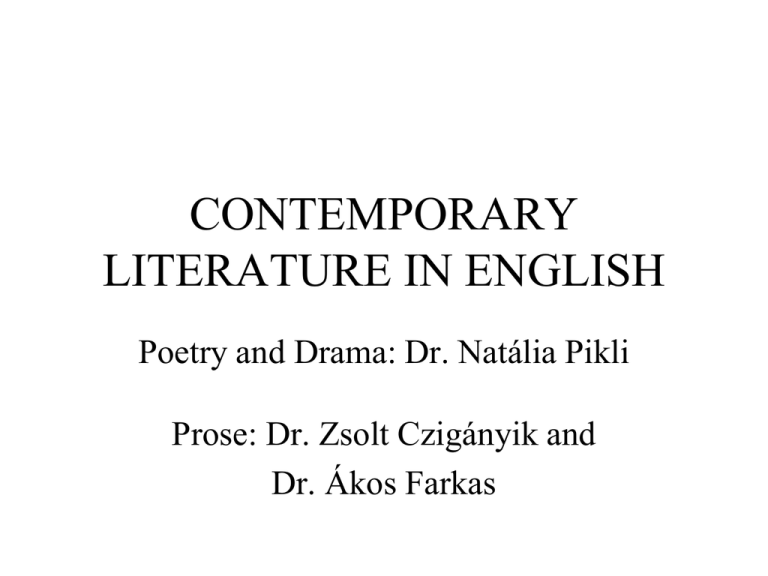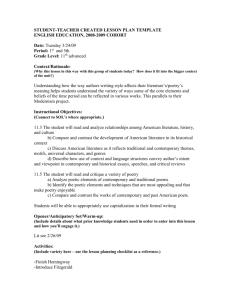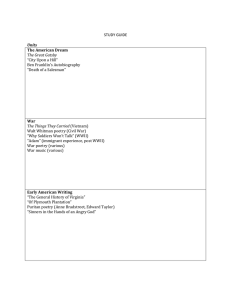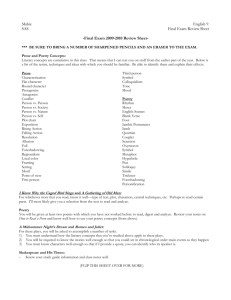Orientation Lecture 1
advertisement

CONTEMPORARY LITERATURE IN ENGLISH Poetry and Drama: Dr. Natália Pikli Prose: Dr. Zsolt Czigányik and Dr. Ákos Farkas 1, September 9 2, September 16 3, September 23 4, September 30 5, October 7 6, October 14 7, October 21 8, November 4 9, November 11 10, November 18 11, November 25 12, December 2 13, December 9 Orientation Ted Hughes Tony Harrison Seamus Heaney Anthony Burgess (lecturer: Ákos Farkas) Carol Ann Duffy John Fowles (October 23-30 autumn break – no lectures) Tom Stoppard Caryl Churchill & in-yer-face theatre Salman Rushdie Julian Barnes Angela Carter and Amy Sackville Tibor Fischer COMPULSORY READINGS AT SEAS3.ELTE.HU Virginia Woolf: Modern Fiction (1925) In making any survey, even the freest and loosest, of modern fiction, it is difficult not to take it for granted that the modern practice of the art is somehow an improvement upon the old. […]And yet the analogy between literature and the process, to choose an example, of making motor cars scarcely holds good beyond the first glance. It is doubtful whether in the course of the centuries, though we have learnt much about making machines, we have learnt anything about making literature. We do not come to write better; all that we can be said to do is to keep moving, now a little in this direction, now in that, but with a circular tendency should the whole course of the track be viewed from a sufficiently lofty pinnacle. It need scarcely be said that we make no claim to stand, even momentarily, upon that vantage ground. On the flat, in the crowd, half blind with dust, we look back with envy to those happier warriors, whose battle is won and whose achievements wear so serene an air of accomplishment that we can scarcely refrain from whispering that the fight was not so fierce for them as for us. It is for the historian of literature to decide; for him to say if we are now beginning or ending or standing in the middle of a great period of prose fiction, for down in the plain little is visible. We only know that certain gratitudes and hostilities inspire us; that certain paths seem to lead to fertile land, others to the dust and the desert; and of this perhaps it may be worth while to attempt some account. Contemporary literature • What is contemporary? • strict sense of the word: author is alive (changes day by day) • in university education: 1960s-present (?) + (personal) preference and choice of lecturers • acquiring literature in chronological order: practical benefits • museums vs. parents • Contemporary: close(r) to the reader no (little) time gap contemporary problems, settings, situations, language, technical devices • ‘Contemporary classics’ What to include in a course? What is valuable? • What will be relevant in 50, 100, 500 years? • canon originally: the books of the Bible officially recognized by the Church literature in general: privileged status of ”great literature” • Canon: necessary (yearly ca. 3.000 novels in English) • Despite debates, with a sufficient perspective, a canon is formed Ladányi took out a book – the Analects of Confucius. ‘Is it any good?’ Gyuri questioned. ‘Life is too short for good books,’ said Ladányi, ‘one should only read great books.’ ‘How can you tell if it’s great?’ ‘If it’s been around for a couple of thousand years, that’s usually a good sign. (Tibor Fischer: Under the Frog) The canon – in change: 19832009 • ”The National Poetry Society Competition has again (see last year) failed to unearth convincing winners from a total of 12,000 submissions. The first prize of ₤ 2,000 was awarded […] to ‘Whoever She Was’ by Carol Ann Duffy. This is quite an effective evocation of some eerie moments in the relation between motherhood and childhood, but much of the detail is predictable, and the language is not very interesting, so that the poem doesn’t improve with repeated readings.” (Review, 1983) • vs 2009: Poet Laureate, ”the most studied poet in schools after Shakespeare” the canon - in change: gender issues • Carol Ann Duffy, ed.: Answering Back, 2008 • 46 poets – 23 men/23 women • Caryl Churchill, playwright – 1960s: ”women can’t do structure [in drama]” vs the most celebrated/intricately structured plays prizes, awards, venues & canon formation Nobel Prize in Literature (author) 2013: Alice Munro 2007: Doris Lessing 2005: Harold Pinter 1995: Seamus Heaney – fiction: (Man) Booker Prize (since 1969): 'the best novel in the opinion of the judges‘ (common man) to increase the reading of quality fiction and to attract 'the intelligent general audience'. (ww.themanbookerprize.com) Man Booker International Prize 2015: László Krasznahorkai – drama/theatre: Tony Award, theatrical venues: Royal Court Theatre, NT, RSC – poetry: Poet Laureate, National Poetry Competition, journals vs internet popular and/or elite? • contemporary literature /postmodern • blurring the borderline – PLAY with tradition/elite culture – influence of popular culture: Tarantino on inyerface-theatre, etc. – problem: entertainment and/or aesthetic values (’twilight zone’ – eg. slam poetry?) Poetry and Drama: ‘the old/young’ • Ted Hughes † (1998), Tony Harrison, Seamus Heaney † (2013), Caryl Churchill, Tom Stoppard in their 70s • Ted Hughes, Carol Ann Duffy (2009): Poets Laureate, Heaney: Nobel Prize, Sir Tom Stoppard – ‘established’ and huge influence on younger generations • BUT: necessary cuts (eg. not Andrew Motion – Poet Laurate 1999-2009) + sorry state of availability of texts in Hungary… http://literature.britishcouncil.org/writers http://www.inyerface-theatre.com Poetry Society, etc. ’canonised contemporaries’ (contradiction; doubts regarding future evaluation) poetry today: English authorsHungarian relevance • festivals (Hay Festival, Budapest, spring 2012 – Tibor Fischer, Ben Okri, Dragomán György) – contemporary writers in interaction across borders • translations-interaction (S. Heaney – Győző Ferencz, Ted Hughes-Pilinszky, etc.) • Why poetry? Facebook challenge - ”Poets don’t have solutions, poets are recording human experience” (Carol Ann Duffy) Poetry classes • Ted Hughes: from the celebrated ‘arrogant’ young poet of the 60s to the dying confessional author of Birthday Letters (1989) – masculinity, myth, animals and the human • Tony Harrison: v the emblematic long poem of the 80s – issues relevant even today Poetry classes • Seamus Heaney: Irish and/or British? postcolonialism, national and individual identity (”be advised / my passport is green” vs Beowulf) • Carol Ann Duffy (b. 1955): a woman poet, Scottish, Lesbian love, dramatic monologues, philosophy/clichés, rewriting famous narratives, social concerns Drama • London theatrical scene / Fringe theatres – eager to receive a great number of new plays every year • Focal points: – Tom Stoppard – first great success 1960s (RosGuil), international fame, Hollywood/Oscar-winning film: ‘the curious fate and fortunes of the successful contemporary playwright’ - a popular classic – Caryl Churchill – social ills, current themes – stockbrokers/male-female social roles/cloning and identity, etc. – 1990s, in-yer-face theatre (Sarah Kane, Jezz Butterworth, Martin MacDonagh, etc., influence of Hollywood/Tarantino) Contemporary English plays on present-day Hungarian stages: Caryl Churchill’s The Skriker (Az iglic), Martin McDonagh’s The Lonesome West (Vaknyugat) Martin McDonagh Radnóti Színház 2001-2011: A kripli (The Cripple of Innishman, 1996, transl. Dániel Varró, first transl. by Anna Szabó T.) • 6 plays ca. 40 performances in Hungary since 1997 (5 plays in 2007) –> Csaba Székely: Mine Country (Bányavidék) • Hollywood: In Bruges (Erőszakik), Seven Psychopaths (A hét pszichopata és a Si-cu) Prose Anthony Burgess (1917-1993) prolific, popular and philosophic A Clockwork Orange (1962) John Fowles (1926-2005) Metafiction, redefining the role of the author The French Lieutenant’s Woman (1969) Angela Carter (1940-1992) Feminist retelling of fairy tales The Bloody Chamber (1979) Salman Rushdie (1947-) postcolonialism, pop-culture Midnight’s Children (1981) Julian Barnes (1946-) Grand narrative? Flaubert’s Parrot (1984) A History of the World in 10 ½ Chapters (1989) Tibor Fischer (1959-) humour and tragedy Under the Frog (1992) Amy Sackville (1981-) Postvictorian post-postmodern Individualism and community The Still Point (2010) Postmodernism • Modernism (early 20th c.): breaks with artistic traditions and conventions, experimentation • with time the experiment becomes conventional • No clear barrier between modernism and post-modernism (cultural history: palimpsest) Ihab Hassan, The Postmodern Turn. Columbus: Ohio State University Press, 1987. • Modernism Form (closed) Purpose Design Hierarchy Finished Art Object Distance Totalization Depth Determinacy Postmodernism Anti-form (open) Play Chance Anarchy Process/Performance Participation Deconstruction Surface Indeterminacy Postmodernism • vague and fashionable term • meaning and value: disputed no (little) perspective (How to define our own age?) • poststructuralism and deconstruction ”meaning is neither inherent in language, nor in the world of things but is ‘constructed’ by conventional frameworks of thought and language” (Gray, 1992) • individuality, human character, freedom: constructs of a particular culture and time (vs. universal truths, absolute authenticity relativised) What small potatoes we are… Postmodern • Man no longer the centre of the universe – no centre • Threats of extinction of humanity (nuclear holocaust, despoiling the environment/planet, overpopulation) breaking up of traditional communities => sense of despair and disillusionment (vs. 60s) • result of meaninglessness: play with styles and values • a sense of disjunction or deliberate confusion, irony, playfulness, reflexivity • A postmodern insistence on process rather than product: a “postmodern” cultural artifact is one that consistently questions itself and the context that it seems to fit within. • Nealon, Jeffrey, and Susan Searls Giroux. The Theory Toolbox. New York: Rowman and Littlefield, 2012. • postmodern texts look at themselves as texts (Ø illusion, isolated from author and extratextual reality) often reveal the instability of language meanings are constructions freedom of interpretation (limitless?) • Postmodernism, celebrates the freedom of possibility, but it also seems to make agency or concrete decision impossible. Return of the grand narrative • PM: rhetoric of disruption (everything has to be new, break in human experience) heroic age of theory • Incredulity toward metanarratives (Lyotard) progress, enlightenment, Christianity • 2000: West forced to reflect on the foundations of its own civilization „seek to make sense of the grand narratives” • How far is it relevant in the 21st century? post-postmodernism? re-evaluation of traditional values and communities (religion, nation) • Alan Kirby: Digimodernism 1990s: decomposing postmodernism (hybrid) 21st c. new cultural paradigm PoMo obsolete (once fresh), creative period over • Computerization of text _> new form of textuality social and multiple authorship triggered by the redefinition of textuality and culture by the spread of digitalization • reality TV, Web2.0, videogames, radio shows: reader/viewer intervenes • PM: objectivity does not exist, truth is social construct Facebook e-friendship between accounts (well designed, so the e-textualization often invisible) for many: indistinguishable from actual friendship




